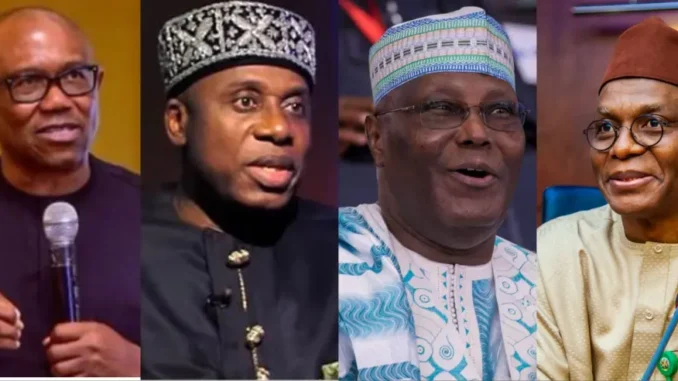
By Divine Sam
As Nigeria edges closer to the 2027 general elections, political tensions are mounting as a powerful coalition of opposition leaders and disgruntled members of the ruling All Progressives Congress (APC) begin aligning to challenge President Bola Tinubu’s re-election bid.
Key political figures including former Vice President Atiku Abubakar, Labour Party’s 2023 presidential candidate Peter Obi, ex-Kaduna governor Nasir El-Rufai, former Minister of Transportation Rotimi Amaechi, and former Secretary to the Government of the Federation (SGF), Babachir Lawal, are spearheading the coalition talks. Ralphs Okey Nwosu, National Chairman of the African Democratic Congress (ADC), is also a notable figure in the ongoing movement.
Possible Atiku-Obi Alliance
There is growing speculation that Peter Obi may run as Atiku’s vice-presidential candidate, rekindling their 2019 ticket under the Peoples Democratic Party (PDP), where they lost to Muhammadu Buhari. Although both contested separately in 2023—Atiku for the PDP and Obi for the Labour Party—their combined vote tally nearly matched that of Tinubu, sparking discussions about the potential strength of a unified front.
Political analysts suggest that a joint ticket could significantly boost the opposition’s chances in 2027. However, no official agreement has been reached, and Obi’s camp has dismissed reports of him accepting a deputy role, insisting he remains focused on a presidential run.
APC’s Defensive Strategy
Sources within the APC reveal that the party is unsettled by the growing opposition momentum. In response, the party is reportedly offering automatic re-election tickets to all first-term governors and pledging full support to secure their victories. This move is seen as a strategy to attract opposition governors concerned about their political survival.
According to insider reports, governors from states like Delta and Akwa Ibom have been pressured or incentivized to defect to the APC. For instance, the Delta governor is said to have joined the APC to avoid a tough race against Tinubu-backed Festus Keyamo.
The APC is also allowing governors to handpick candidates for national assembly seats, further consolidating their control ahead of 2027.
Coalition’s Internal Challenges
Despite the coalition’s promise, cracks are beginning to show—particularly over which party will serve as the coalition’s platform. Although the ADC reportedly amended its constitution to accommodate new high-profile entrants, this has sparked backlash from existing members unwilling to cede influence.
The situation grew more complex when Peter Obi, in a recent viral video, confirmed plans to run under the Labour Party banner, while the party leadership denied knowledge of any coalition or alliance, reaffirming its commitment to an independent campaign and primary process.
Adding to the uncertainty, Social Democratic Party (SDP) presidential candidate Adewole Adebayo declared he would not step down for any candidate in the 2027 race.
Yunusa Tanko, National Coordinator of the Obidient Movement, also stated that Peter Obi has not confirmed any plan to run as a vice-presidential candidate. “He stands to contest as a presidential candidate,” Tanko noted, adding that what exists for now is a strategic conversation among like-minded political actors.
As Nigeria’s political landscape heats up, the race to 2027 is shaping into a complex battle of alliances, interests, and ideologies.